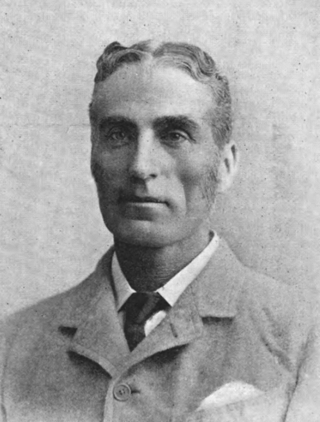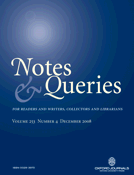
Academic publishing is the subfield of publishing which distributes academic research and scholarship. Most academic work is published in academic journal articles, books or theses. The part of academic written output that is not formally published but merely printed up or posted on the Internet is often called "grey literature". Most scientific and scholarly journals, and many academic and scholarly books, though not all, are based on some form of peer review or editorial refereeing to qualify texts for publication. Peer review quality and selectivity standards vary greatly from journal to journal, publisher to publisher, and field to field.

The Encyclopædia Metropolitana was an encyclopedic work published in London, from 1817 to 1845, by part publication. In all it came to quarto, 30 vols., having been issued in 59 parts.

Francis Hindes Groome was a writer and foremost commentator of his time on the Romani people, their language, life, history, customs, beliefs, and lore.
Charles Herbert Mayo (1845–1929) was a Dorset clergyman and antiquarian.

William John Thoms was a British writer credited with coining the term "folklore" in 1846. Thoms' investigation of folklore and myth led to a later career of debunking longevity myths, and he was a pioneer demographer.
Katharine Mary Briggs was a British folklorist and writer, who wrote The Anatomy of Puck, the four-volume A Dictionary of British Folk-Tales in the English Language, and various other books on fairies and folklore. From 1969 to 1972, she was president of the Folklore Society, which established an award in her name to commemorate her life and work.
Iona Margaret Balfour Opie, and Peter Mason Opie were an English married team of folklorists who applied modern techniques to understanding children's literature and play, in studies such as The Oxford Dictionary of Nursery Rhymes (1951) and The Lore and Language of Schoolchildren (1959). They were also noted anthologists, assembled large collections of children's literature, toys, and games and were regarded as world-famous authorities on children's lore and customs.
The Folklore Society (FLS) is a registered charity under English law based in London, England for the study of folklore. Its office is at 50 Fitzroy Street, London home of the Royal Anthropological Institute of Great Britain and Ireland.
Canadian Notes & Queries is a literary magazine published in Canada on a triannual basis.

John Symonds Udal was an English-born cricketer, antiquarian, author, lawyer and judge. He represented the Fiji national cricket team. He also held government office in Fiji for many years, serving as Attorney-General from 1889 to 1899. He later served as Chief Justice of the Leeward Islands.
Edward Peacock was an English antiquarian and novelist.

The Dorset Ooser is a wooden head that featured in the 19th-century folk culture of Melbury Osmond, a village in the southwestern English county of Dorset. The head was hollow, thus perhaps serving as a mask, and included a humanoid face with horns, a beard, and a hinged jaw which allowed the mouth to open and close. Although sometimes used to scare people during practical jokes, its main recorded purpose was as part of a local variant of the charivari custom known as "skimity riding" or "rough music", in which it was used to humiliate those who were deemed to have behaved in an immoral manner.
Eliza Gutch (1840-1931) was an English author, contributor to Notes and Queries, and founding member of the Folklore Society. She made immense contributions to the establishment of folklore and dialect studies.

Dimitrios "Dimitris" Loukatos (1908–2003), was a folklorist-anthropologist and specialist in Greek folklore.
Southerly is an Australian literary magazine, established in the 1930s. It is published in hardcopy and online three times a year, and carries fiction and poetry by established and new authors as well as reviews and critical essays. The Long Paddock is an online supplement, carrying additional material.
ANQ: A Quarterly Journal of Short Articles, Notes and Reviews is a quarterly academic journal, affiliated to the University of Kentucky, which features short research-based articles about the literature of the English-speaking world and the language of literature.
Mabel Geraldine Woodruffe Peacock was an English folklorist.
John Mathew Gutch (1776-1861) was an English journalist and historian.
An authors' editor is a language professional who works "with authors to make draft texts fit for purpose". They edit manuscripts that have been drafted by the author but have not yet been submitted to a publisher for publication. This type of editing is called author editing, to distinguish it from other types of editing done for publishers on documents already accepted for publication: an authors' editor works "with an author rather than for a publisher". A term sometimes used synonymously with authors' editor is "manuscript editor" which, however, is less precise as it also refers to editors employed by scholarly journals to edit manuscripts after acceptance.

The China Review: Or, Notes and Queries on the Far East was an academic journal published in Hong Kong from 1872 to 1901 as an outlet for scholarly writings on China written by foreign scholars, mainly those living on the China coast. The journal was edited in its initial years by Nicholas Belfeld Dennys, editor of the China Mail, a Hong Kong newspaper. In the first volume, Dennys stated that the review would include original papers on "the Arts and Sciences, Ethnology, Folklore, Geography, History, Literature, Mythology, Manners and Customs, Natural History, Religion, etc." and would cover "China, Japan, Mongolia, Tibet, The Eastern Archipelago, and the 'Far East' generally." He noted that the purpose was similar to Notes and Queries on China and Japan, which had ceased publication in 1869. The second editor-in-chief was Ernst Johann Eitel, a former missionary of the Basel Mission and the London Missionary Society. The journal was not supported by any church, but missionaries frequently published articles of sinological interest.








